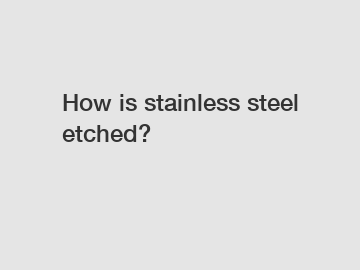How is stainless steel etched?
How is stainless steel etched?
Stainless steel etching is a process that involves selectively removing material from the surface of stainless steel using an acid solution. This method is commonly used for creating intricate designs, patterns, or textures on stainless steel products. The etching process allows for precise control over the depth and shape of the etched area, resulting in highly detailed and visually appealing finishes.
The etching process begins with the preparation of a stencil, which is typically made of a resistant material such as photoresist or a metal mask. The stencil is then applied to the stainless steel surface, and the areas that are not intended to be etched are protected by the stencil. The stainless steel is then exposed to an etchant, usually an acid solution, which selectively removes the unprotected areas of the surface.

There are several different etching techniques that can be used for stainless steel, including chemical etching, electro-chemical etching, and laser etching. Chemical etching involves immersing the stainless steel in an acid solution, such as nitric acid or ferric chloride. Electro-chemical etching, on the other hand, involves passing an electric current through the stainless steel while it is submerged in an electrolyte solution. Laser etching, as the name suggests, uses laser beams to ablate the surface of the stainless steel.
The choice of etching technique depends on various factors, such as the desired etch depth, surface finish, and complexity of the design. Each technique has its advantages and limitations, and the selection of the most suitable technique is crucial to achieve the desired result.
Stainless steel etching has numerous applications across various industries. In the automotive and aerospace industries, etched stainless steel components are used for decorative purposes, as well as for identification and labeling. In the electronics industry, etching is used to produce microcircuits and electrical contacts on stainless steel substrates. Additionally, in the medical field, stainless steel etching is employed to create precision surgical instruments and implants.
The etching process offers several advantages over other traditional manufacturing methods. Firstly, it allows for the creation of complex and intricate designs that are difficult to achieve using conventional machining techniques. Secondly, it does not alter the mechanical properties of the stainless steel, resulting in the retention of its strength and corrosion resistance. Furthermore, the etching process is highly repeatable, ensuring consistent and uniform results.
In conclusion, stainless steel etching is a versatile and precise method for creating decorative finishes and functional components. Through the selective removal of material from the surface of stainless steel using acid solutions, intricate designs can be achieved without compromising the mechanical properties of the material. This process has found widespread applications in various industries, contributing to the production of aesthetically appealing and highly functional stainless steel products.
The company is the world’s best No 8 Mirror Finish Stainless Steel Sheet, Corrugated Stainless Steel Sheet Manufacturer, No.8 Mirror Finish Stainless Steel Plate supplier. We are your one-stop shop for all needs. Our staff are highly-specialized and will help you find the product you need.


